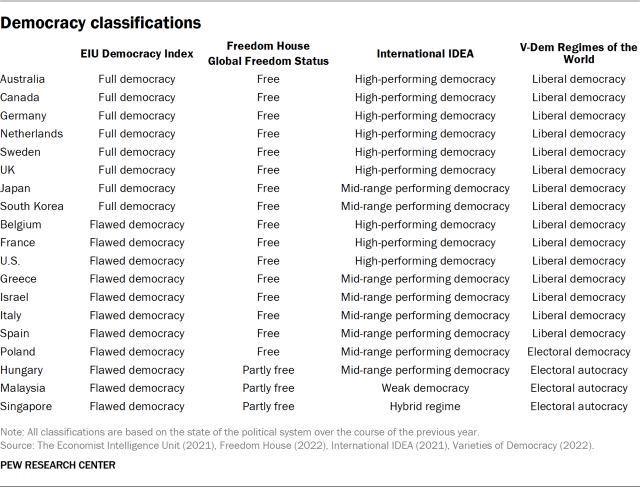We use three measures to better understand the status of democracy across the advanced economies included in our survey: 2021 Democracy Index scores from the Economist Intelligence Unit (EIU), 2022 Global Freedom Status scores provided by Freedom House, 2021 Global State of Democracy indices from International IDEA and Regimes of the World classifications from Varieties of Democracy (V-Dem). Each organization uses different methods for classifying political systems, so using data from multiple sources can provide a more complete picture of the status of democracy across the survey publics.
The EIU Democracy Index is based on ratings across 60 indicators, grouped into five categories: electoral process and pluralism, civil liberties, the functioning of government, political participation and political culture. Countries are categorized into regime types based on their overall score on the index. Full democracies are ones in which basic freedoms and liberties are respected, with few problems in how democracy is functioning. Flawed democracies have more substantial issues, such as low levels of political participation or problems in how the society is governed, though they still meet the basic requirements of free elections and respect for civil liberties. All the publics included in the current Pew Research Center survey are classified as either full or flawed democracies, but the EIU classification includes two other categories: hybrid regimes and authoritarian regimes.
Researchers and experts at Freedom House assign scores to countries and territories across the globe on 10 indicators of political rights (e.g., whether there is a realistic opportunity for opposition parties to gain power through elections) and 15 indicators of civil liberties (e.g., whether there is a free and independent media). For each measure, scores range from 0, representing the smallest degree of freedom, to 4, indicating the largest degree of freedom. Based on their combined score across all indicators, Freedom House classifies societies as free, partly free or not free. Each category covers a broad range of countries and territories and, therefore, within each classification there can be a lot of variation. Overall, those classified as free have relatively more freedom than those considered partly free or not free.
International IDEA compiles data from 12 different data sources, including expert surveys and observational data, to create their Global State of Democracy indices, which measure five core attributes of democracy. One attribute – Representative Government – is used to classify countries as either a democracy, a hybrid regime or an authoritarian regime. The Representative Government measure includes data on the extent to which voting rights are inclusive, political parties are free to form and campaign for office, elections are free, and political offices are filled through elections. Higher scores on the attribute (ranging from 0 to 1) indicate a more representative government. Countries are classified as democracies if they score at least 0.4 on the measure and have competitive multiparty elections. Hybrid regimes have a score of at least 0.4, as well, but do not have competitive elections. Authoritarian regimes score below 0.4 on the Representative Government measure and do not have competitive elections. Within democracies, International IDEA further classifies countries as high-performing, midrange-performing, and weak-performing based on scores across all five attributes of democracy: representative government, fundamental rights, checks on government, impartial administration and participatory engagement.
V-Dem has local experts respond to a large set of questions about the political system and society in countries and locations across the world. For our purposes, we use the Regimes of the World question, where experts indicate how the political regime should be classified – closed autocracy, electoral autocracy, electoral democracy or liberal democracy – based on how their elections work and other factors related to how their government functions. Nearly every public in our survey is considered a liberal democracy, meaning experts rate their elections as free and fair, with multiple parties, and provide positive assessments of different aspects of their government, such as respect for personal liberties and rule of law. V-Dem classifies Poland as an electoral democracy, where liberal aspects of democracy, such as access to justice or respect for personal liberties are constrained. Hungary, Malaysia and Singapore are classified as electoral autocracies, defined as having “de-jure multiparty elections for the chief executive and the legislature, but failing to achieve that elections are free and fair, or de-facto multiparty.”





